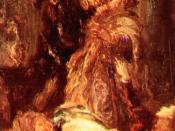Tanbir Singh Hamlet Essay (Good Copy) November 11, 2010
Cause and Effect in Hamlet
The issues of love, hate, jealous, incest, power struggle, and most importantly the revenge. These themes are all present in Hamlet, and were a theatre element that was most enjoyed by Elizabethan audiences. There are really only two great "speeches" in Act IV of Hamlet, one by Hamlet and one by the King Claudius. The King's speech, in Act IV, Scene 5, which begins "O, this is the poison of deep grief," gives a sort of summary of the situation in the play at that particular point. Hamlet's speech in Act IV, Scene4 is probably the most affective one in the play "Rightly to be great Is not to stir without great argument, But greatly to find quarrel in a straw, When honor's at the stake."
In the Elizabethan era version of Hamlet by William Shakespeare, many characters' actions have an effect on the audience viewing the play.
In Act I Scene IV King Claudius discovers that Hamlet has killed Polonius, his chief counsellor. This enrages Claudius and he expresses anger, fear and disappointment. These actions shown by Claudius affect the audience of the Elizabethan era because it shows that a King feels authority, humanity and inefficacy.
Authority has always been a principle part of society. All rulers have used authority as control over people and their lives. King Claudius feels so powerful and has abused his authority with no regrets. He wants hamlet to be jailed for the crime he has committed. This expression of anger and authority by the King would have a great effect on the Elizabethan audience. This would probably make the audience fearful of committing any crime. It would also make them respect their King more because they would...


